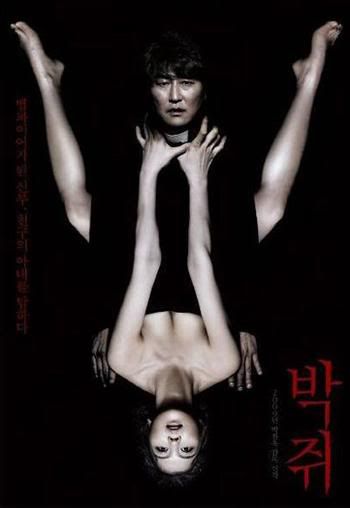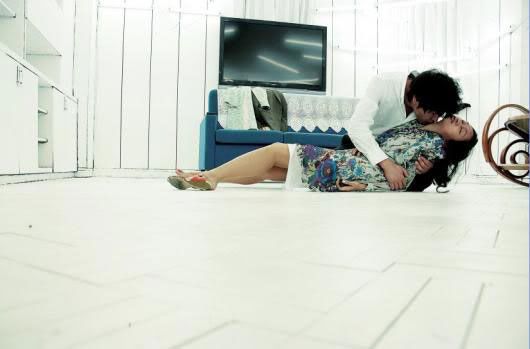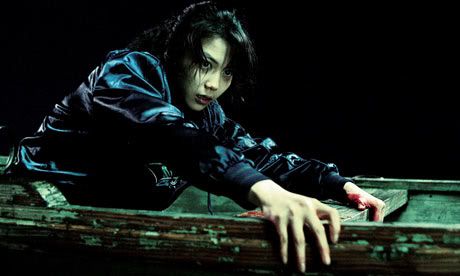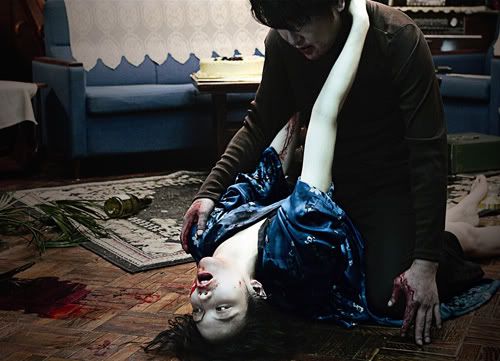Thirst

Title: Thirst
Rating: 4/5
Genre: Drama, Horror, (Comedy)
Director: Chan-Wook Park
Starring: Kang-Ho Song (The Host), Ok-Vin Kim
With Lars Von Trier’s work on ‘Anti-Christ,’ and now Chan-Wook Park’s ‘Thirst,’ I was sure this was to be the year of horror’s revitalization and re-integration into the light of big budgets and competent cast members, and it still might be, but this film wont be standing along side them. Following the torment of a priest (Kang-Ho Song), leaving to assist with an experimental cure with the best of intentions, he becomes infected with the deadly incurable virus, only saved by the accidental transfusion of vampire blood. Afflicted with a terrible disease kept at bay by his vampirism he retains his humanity, becoming stricken with guilt every time he nourishes himself on human blood blood, careful to not cause permanent harm, his sinful desires only worsen as he becomes smitten with the shy resident of his lodging, ‘Tae-Jou,’ married and living with her overbearing parents-in-law.
 In truth, I’m more than a little conflicted by this film. I’m a Chan-Wook Park fan – there’s no use in me denying that – and having seen all but one of his releases I know just what he is capable of, and yet here he at times feels as much a hindrance as a help. Mis-marketed as a horror, the focus placed far more firmly upon the emotional conflicts of the characters as they question morality, the dry horror element comes as often as the dark comedy, never emphasised in the typical manner, instead it presents itself apathetic to any audience reaction. Furthermore, perhaps in order to try to maintain flow, many scenes seemed longer than necessary to make their point; the sex scene a perfect example, whilst on one hand demonstrating his daring and an essential scene, the excessive length was entirely unjustified (though not unwelcome: rawr) doing nothing to further the plot and just beginning to cheapen the story.
In truth, I’m more than a little conflicted by this film. I’m a Chan-Wook Park fan – there’s no use in me denying that – and having seen all but one of his releases I know just what he is capable of, and yet here he at times feels as much a hindrance as a help. Mis-marketed as a horror, the focus placed far more firmly upon the emotional conflicts of the characters as they question morality, the dry horror element comes as often as the dark comedy, never emphasised in the typical manner, instead it presents itself apathetic to any audience reaction. Furthermore, perhaps in order to try to maintain flow, many scenes seemed longer than necessary to make their point; the sex scene a perfect example, whilst on one hand demonstrating his daring and an essential scene, the excessive length was entirely unjustified (though not unwelcome: rawr) doing nothing to further the plot and just beginning to cheapen the story. Making careful use of light, both excessively bright, uncovering the faces so often shrouded by darkness and contrasting the lush reds against the harsh whites, he more often than not uses excessive darkness, the pitch black shadows rendering the cast almost invisible at times, able to make out figures and sound but little more detail, and it is simply too dark for too long. The intentional morbid and gothic atmosphere easily attained and the contrast further emphasizes their plight, but it altogether alienates the viewer which becomes a major issue. The classic tragedy script and plight of the tormented priest all too difficult to empathise with, the characters expressions often lost through no fault of their own, and watching with subtitles leaving only the most obvious of emotions noticeable in their speech.
 And yet for all the prevalent issues with the story, it is the magnificent displays from Kang-Ho Song and Ok-Vin Kim that rescues what could quickly be heading for a disappointment. The contrast in his character here and ‘The Host’ is uncanny, demonstrating his ability to perform a multitude of roles. Bringing to life the notion of ‘actions speaking louder than words,’ it is the expressions in his face that give away more meaning than the dialogue ever could; the pressures put upon him as a priest, the conflict and initial reluctance to give up his vow of chastity, slowly, subtly and almost unnoticeably transforming into the monster as the film continues until the closing moments. All the time his 22 year old counterpart, Ok-Vin Kim, displays her blossoming abilities and giving a performance beyond what you’d expect from someone with her limited experience, perhaps only transitioning a little too suddenly for the final moments that display her at her best. This romantic element could easily have become trapped in clichés, but is instead elevated as they demonstrate both their highs and lows, conflicts and what they are willing to do for one another, conveying a genuine sense of a dysfunctional relationship borne from lust that almost compensates for the viewers’ own detachment from the proceedings.
And yet for all the prevalent issues with the story, it is the magnificent displays from Kang-Ho Song and Ok-Vin Kim that rescues what could quickly be heading for a disappointment. The contrast in his character here and ‘The Host’ is uncanny, demonstrating his ability to perform a multitude of roles. Bringing to life the notion of ‘actions speaking louder than words,’ it is the expressions in his face that give away more meaning than the dialogue ever could; the pressures put upon him as a priest, the conflict and initial reluctance to give up his vow of chastity, slowly, subtly and almost unnoticeably transforming into the monster as the film continues until the closing moments. All the time his 22 year old counterpart, Ok-Vin Kim, displays her blossoming abilities and giving a performance beyond what you’d expect from someone with her limited experience, perhaps only transitioning a little too suddenly for the final moments that display her at her best. This romantic element could easily have become trapped in clichés, but is instead elevated as they demonstrate both their highs and lows, conflicts and what they are willing to do for one another, conveying a genuine sense of a dysfunctional relationship borne from lust that almost compensates for the viewers’ own detachment from the proceedings.There is also a very minimalist soundtrack which ends up working to the films advantage, only occasionally used to emphasise a certain scene (and even then for only a brief moment). Going for the realistic approach he relies on sound effects to create his music; the obvious yet quiet lip-smacking and slurping to the gentle sounds of wind in the trees, or the laughter of those nearby, all feeling so
 carefully constructed as to be music in itself, allowing enough of a free reign to let the actions of the cast and the script display everything required. It also leaves more to the imagination, particularly considering the directors style of direction, carefully choosing an angle and then determinately sticking to that single frame, letting the actors stray out of shot leaving a single solitary image with the sounds of those nearby.
carefully constructed as to be music in itself, allowing enough of a free reign to let the actions of the cast and the script display everything required. It also leaves more to the imagination, particularly considering the directors style of direction, carefully choosing an angle and then determinately sticking to that single frame, letting the actors stray out of shot leaving a single solitary image with the sounds of those nearby.Despite his critical thinking of the vampire cliché, treating the vampirism as a genuine affliction that for the first half could almost be substituted for a modified pre-existing condition (‘Xeroderma Pigmentosum’ or the manner ‘Sickle-Cell Anaemia,’ resists the far more unmanageable malaria, acting as a disease that ‘cures’ other ailments both come to mind), not resorting to physical effects to demonstrate their vampirism and their general mannerisms lending his own logical thought processes to the subject matter, he still feels all too constrained and restricted; unable to strive for absolute realism whilst still playing to his uncanny strength for stylish choreographed sequences and toying with the audiences emotions as in his ‘Vengeance Trilogy,’ nor even play around with original and abstract ideas such as ‘I’m a Cyborg.’ It’s still unquestionably Chan-Wook Park, and whilst restrained I still can’t think of a better vampire drama.

Nice, can't wait to see it!
ReplyDelete